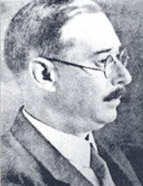

The sapiential matrix of the man from Figueira will be reread by new generations as a model: suffice it to mention, in philosophical essayism, Eduardo Lourenço (b. 1923), just think of Heterodoxia I [ H eterodoxy] , an excellent use of dialogue by the young assistant (1949), or, in the history of ideas, Fernando Catroga (b. 1945), in explaining the Anterian (the Hegel, Proudhon, Hartmann correlation; spiritual evolution ; the discreet departure from the ‘two Anteros’ of Sérgio ) and in the study of republicanism.
2. In the university, JC grasps the heuristic and methodological effort of the documentalist lesson: among us, from João Pedro Ribeiro to Herculano (a hermeneutist), Gama Barros, Costa Lobo, Braamcamp, Mendes dos Remédios, António de Vasconcelos; and of the philological and erudite tradition (José Maria Rodrigues, Carolina Michaëllis), although he distances himself from the uncritical cult of the source by recognising that ‘history is not the document, although without documents one cannot make history’ ( OC , V, p.307) – and sets out the first historiographical problem, which he will pursue with obstinate method: the inventorying of sources and their interpretation in order to establish what he then calls ‘studies (...) of the History of Portuguese Philosophy’, ‘although disputed by some, indifferent to most, but utilised by strangers’ ( António de Gouveia e o aristotelismo da Renascença [António de Gouveia and the Aristotelianism of the Renaissance] , 1916).
What is it that sets him apart from the generation of the 1950s and its apparently similar claim? The late question raises the intrinsic and paradoxical apology for Portuguese ‘universality’, an onticity into which he did not fall ( you cannot fly to where you already are, Lourenço would retort to Álvaro Ribeiro) and the isolationism that intones the national excellence of Portugueseness. ‘I believe I know that the nature and content of philosophy are supranational, or rather, a-national’, but this should be mediated by ‘ the metaphysical explanation of the reality we live in ’ in order to find ‘ problems and philosophies more or less correlated with our idiosyncrasy ’ ( OC , V, pp.114-15). The dissent is centred on the extrinsic evaluation of the long scholastic tradition and, on the contrary , the enlightened position on Modernity, which JC reads as the turning point of all knowledge. While in 1927 he indicates ‘the analytical and secure inventory of biobibliographical facts and the partial examination of intellectual problems and concerns’ of philosophical culture in Portugal ( Idem , I, p.337), he would recognise that it was ‘born under the influence of the movement of ideas that gave rise to the Scholasticism of the 12 th century’ ( Idem , II, p.374 ); and, in Descartes e a cultura filosófica portuguesa [ Descartes and the Portuguese Philosophical Culture] , he saw in the last scholasticism from Coimbra ( post Pedro da Fonseca and Suárez) ‘the swan song of the scientific ideal’ of Aristotle; who, in his syllogistic deduction, ‘entangled reason in an abstract mechanics that isolated it from any sense of renewal and (...) bound it to a static knowledge’ ( Idem , V, p.303).
This work is financed by national funds through FCT - Foundation for Science and Technology, I.P, in the scope of the projects UIDB/04311/2020 and UIDP/04311/2020.
